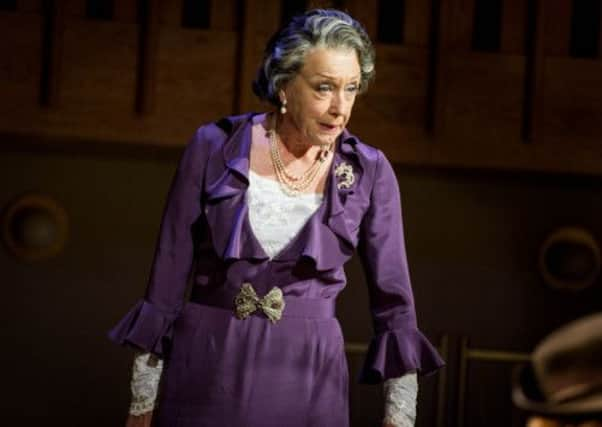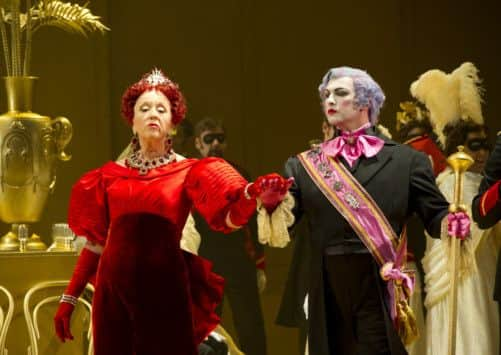Dame Josephine Barstow: In good voice for fun Britten opera


As part of the ongoing celebrations for the centenary of Benjamin Britten’s birth, Opera North is staging a new production of the composer’s charming chamber opera Albert Herring which opened this week in the Howard Assembly Room in Leeds.
Set in rural Suffolk at the turn of the twentieth century, Albert Herring was once described by the famous Russian pianist and conductor Sviatoslav Richter as the “greatest comic opera of the century” – although it wasn’t always regarded as such.
Advertisement
Hide AdAdvertisement
Hide AdWritten over the winter of 1946, the opera premiered at Glyndebourne in June 1947 and the then director is reported to have told first night audiences as they arrived that “it is not quite our sort of thing, you know.” Endearing, light-hearted and very funny, it has since gone on to be a popular choice with opera companies all over the world and has been successfully performed everywhere from Moscow, Paris, Linz and Copenhagen to Portland in Oregon and Santa Fe.


As May Day approaches, the fictional small town of Loxford is in uproar. Festival organiser the formidable Lady Billows is at her wits’ end as all the young women who could potentially be May Queens are deemed to be morally unsuitable.
In an act of desperation the festival committee and village folk decide instead to crown a May King. They choose the sweet innocent Albert Herring, who works at the local greengrocers. He isn’t particularly enthusiastic about the idea but since he is firmly under the control of his mother, he agrees to do as he is told. However, things start to unravel at the May Day ceremony after Albert inadvertently drinks a rum-laced lemonade and decides to head into town with his prize money to explore for himself the pleasures of life that have so far been denied him. The next morning Albert has still not returned and the village is in a panic...
Based on a short story by the French writer Guy de Maupassant, Albert Herring combines Britten’s witty and imaginative score with a masterly libretto by Eric Crozier to create a humorous, well-observed and hugely entertaining tale of small town life. Taking the role of the overbearing Lady Billows, is celebrated Yorkshire-born soprano Dame Josephine Barstow who speaks to me while the company is still in rehearsal. “It’s going quite well, but it is experimental theatre, because we are doing it in the round, so it will be quite intimate,” she says. “It’s fun and a little bit scary; it’s going to take some getting used to but hopefully it will work. It’s certainly going to be something different.” Performing in the intimate space of the Howard Assembly Room and playing the opera in the round means that the production will be a fresh, interesting and unusual experience for audience and performers alike. “You are very close to the audience and the difficulty is in knowing quite how far the audience will want to be involved in what we are doing – or whether they would rather remain on the sidelines,” says Dame Josephine. “We are so close to them you could easily touch them and we will be in among them now and again. My instinct in playing Lady Billows, a character who has her dominant moments, was to go out into the audience and dominate them. I did that in rehearsal today and I was told it didn’t work, so I’m trying to tone it down now,” she says laughing.
Advertisement
Hide AdAdvertisement
Hide AdDame Josephine has played the character of Lady Billows before in an Opera North production directed by Phyllida Lloyd in 2002, as well as recording the part for a CD. Eleven years ago Lloyd also employed an unconventional approach to the opera – it was performed in modern dress with the orchestra up on the stage. “I want to make the character different from the last time,” says Dame Josephine. “And I hope I am making her rather nicer, less domineering and rather more complicated.” She knows that the audience will be entertained by the piece. “It is really very funny,” she says.
“But obviously we as performers have got to play it cool and not push for the laughs.” Dame Josephine was last up in Leeds performing in Opera North’s acclaimed production of Tchaikovsky’s Queen of Spades in 2011, for which she, in particular, received excellent reviews. “I love Opera North,” she says. “It’s my home territory – I am a Yorkshire girl – and it’s always like coming home when I work with them.
“They are such a lovely company and so adventurous and supportive. You are immediately a member of a team.”Another lure of working with the company is that it means she can stay in her Dales cottage throughout the rehearsal and performance period. “The Dales are so beautiful,” she says. “I always forget, when I am not here, how stunningly beautiful it is. I do a lot of walking and I know the area really well – but it still takes my breath away. I am sure there are aspects of my love for this area that feed into my work.”
A fan of Britten’s operas, Dame Josephine has enjoyed some plum roles in the composer’s oeuvre over the years having played in Peter Grimes, Owen Wingrave, A Midsummer Night’s Dream and the lead role as Elizabeth I in Gloriana. “It is wonderful to do his operas,” she says. “The gift of all time for me was doing Gloriana – I absolutely loved that. Britten’s characters are real people you can get your teeth into.” Still in good voice at the age of 72, Dame Josephine’s long and varied career shows little sign of slowing down. “At my age it’s a great treat to be able to work,” she laughs. “I am really enjoying it; I have always loved what I do.”
Advertisement
Hide AdAdvertisement
Hide AdAlbert Herring, Howard Assembly Room, May 18, 19, 21, 23, 24 and 25. www.operanorth.co.uk
Highlights of a long career
Dame Josephine Barstow was born in Sheffield in September 1940. She studied at the University of Birmingham and made her debut with the touring company Opera for All in 1964. In 1965 she won a scholarship to study at the London Opera Centre. During the following season she sang for Sadler’s Wells Opera Company. In 1968 joined the Welsh National Opera and in 1969 made her debut with the Royal Opera as one of the nieces in Peter Grimes. She has performed all over the world including at New York’s Metropolitan Opera, the Vienna State Opera and the Bayreuth Festival.